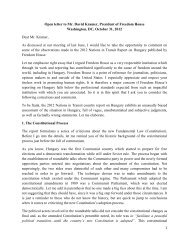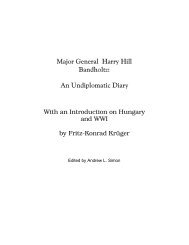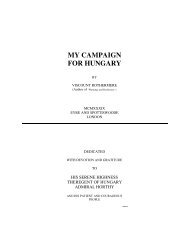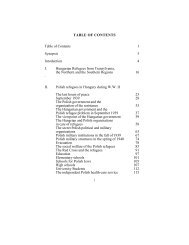The Fate of Western Hungary 1918-1921 - Corvinus Library ...
The Fate of Western Hungary 1918-1921 - Corvinus Library ...
The Fate of Western Hungary 1918-1921 - Corvinus Library ...
Create successful ePaper yourself
Turn your PDF publications into a flip-book with our unique Google optimized e-Paper software.
government.” 67<br />
<strong>The</strong> statute was received with mixed feelings by the affected sides. Some<br />
groups felt that the self-government rights <strong>of</strong> the Hungarian Germans were too<br />
much; the leaders <strong>of</strong> the <strong>Western</strong> <strong>Hungary</strong> National Council, too little. <strong>The</strong>y<br />
especially felt the German community lacked the right to elect a national<br />
assembly with legislative powers, and did not garner significant economic<br />
opportunities. It did not dissuade the intention <strong>of</strong> those wishing to unite with<br />
Austria. <strong>The</strong> development <strong>of</strong> an autonomous legal area completely faltered in<br />
the last weeks <strong>of</strong> the Károlyi regime, mostly due to various, <strong>of</strong>ten overriding,<br />
interests. One <strong>of</strong> the main reasons was that, with the planned creation <strong>of</strong><br />
German autonomy, some villages, which have been county seats for centuries,<br />
were going to lose their position. Among them was Szentgotthárd, which had<br />
36 German-speaking settlements in its district. <strong>The</strong> village’s National Council<br />
petitioned the government in early 1919 to have Szentgotthárd be the district<br />
seat for the villages <strong>of</strong> the German autonomous area, with a German county<br />
court and <strong>of</strong>fice for the German county chief magistrate. <strong>The</strong> petition was taken<br />
by a delegation to the Minister <strong>of</strong> Nationalities in Budapest, to the head <strong>of</strong> the<br />
German National Council in Sopron, Géza Zsombor, and the High Constable <strong>of</strong><br />
Vas County. <strong>The</strong> 500 copies <strong>of</strong> the appeal were printed in Szentgotthárd, in<br />
Hungarian and German, and sent to all the settlements in the district, even to all<br />
shopkeepers with the request to have it displayed in their place <strong>of</strong> business. 68<br />
<strong>The</strong> stand <strong>of</strong> the Szentgotthárd council met with success. <strong>The</strong> delegation to<br />
Budapest reported on March 19 that they received assurance from the Minister<br />
that, within the German autonomous region, the village would remain the<br />
district center.<br />
Mihály Károlyi handed over power to the Hungarian People’s Proletariat on<br />
March 21, 1919 and the Hungarian Soviet Republic was born; the Communist-<br />
Social Democrat coalition Revolutionary Governing Council 69 assumed power.<br />
<strong>The</strong> new Nationalities Minister, Henrik Kalmar 70 (1870-1931), took over from<br />
János Junker and held the position at the German People’s Commissariat as a<br />
People’s Commissar, until his resignation on July 25. Kalmar was originally a<br />
printer, was active in Pozsony as party secretary <strong>of</strong> the Social Democrats, and<br />
later became Undersecretary in the German Ministry in the Berinkey<br />
government. During the period <strong>of</strong> the Hungarian Soviet Republic, he continued<br />
on the development <strong>of</strong> autonomy <strong>of</strong> <strong>Western</strong> <strong>Hungary</strong>. <strong>The</strong> newly created<br />
67 Thurner, op. cit., pp. 9–10.<br />
68 Kiss, Mária, 1981, op. cit., p. 234.<br />
69 Revolutionary Governing Council: the highest executive body <strong>of</strong> the Hungarian<br />
Soviet Republic, which transcended governmental spheres <strong>of</strong> authority and held state<br />
and party powers. Members <strong>of</strong> the Council, on the Soviet model, were commissars,<br />
heading various commissariats that replaced the former ministries. Its president was a<br />
former bricklayer, the Social Democrat Sándor Garbai (1879-1947), but the real power<br />
was excercised by Foreign Affairs Commissar, Béla Kun.<br />
70 Biography <strong>of</strong> Henrik Kalmár. In: Révai Új Lexikona, vol. XI. Főszerk/ed-in-chief:<br />
Kollega, T. István. Szekszárd, 2003, p. 114.<br />
32
















